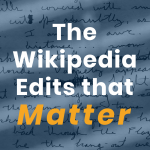Wikipedia 101
Wikipedia articles are highly relevant for businesses, individuals and causes. Their prominent positions in search results make them a top source for gathering information. Furthermore, the site is highly regarded and most readers take the information provided as unbiased and official. The importance of Wikipedia raises many questions for professionals: How do these pages work, and why do they matter? Should you be tracking your Wikipedia article more carefully? Why?
Let’s break it down
Wikipedia is a community in addition to being a website or database, comprised of users, admins, bots and many other direct and indirect participants. It defines itself as “a free encyclopedia, written collaboratively by the people who use it.” Thousands of changes are made across Wikipedia per hour by a wide range of editors, including registered and anonymous editors. The changes have to be substantiated with media citation, to justify “notability.”
Behind the scenes
Edits made by one user are often changed or tweaked by another, and disputes and even “editing wars” are common on the article “Talk pages”. As is true elsewhere in the realm of the internet, seemingly factual statements can often have an underlying tone that elicits an emotional response in the reader, coloring their opinion on the topic in a more positive or negative shade. Wikipedia editors are meant to strive to provide only relevant and neutral information on any given topic; but given the variety of contributors, this has proven a real challenge. Admins have come up with guidelines as well as deterrents such as “Conflict of Interest tags” to shape editors’ behaviors. However, it is an uphill battle to ensure that readers are not affected by personal opinions throughout the encyclopedia.
Why should you care?
Your business website is meticulously curated to reflect the unique advantages of a brand, to speak to a particular audience, and to present a company outlook and impact in the most relatable way. Unfortunately, you don’t have this level of control with Wikipedia; others are controlling your appearance and vying for a say in how you or your company are presented. Wikipedia editors have the ability to influence your reputation by drawing attention to specific information and highlighting particular events or practices while ignoring more positive stories all in the name of notability.
What can you do?
For a professional, this likely sounds daunting, but you can use the platform to your advantage by using it to measure your business’ reputation in a more holistic manner. Monitoring your Wikipedia page allows you to keep a finger on the pulse of your company in the public eye. It can guide your PR firm to recognize the need for more positive media which can be translated into appropriate Wikipedia content.
How do you successfully monitor your Wiki?
There are very few simple ways to effectively keep tabs on a Wikipedia page. You can manually visit the page and review the “History,” which is a log of all edits that have been made on the page. This is quite tedious and is difficult to navigate if you aren’t a seasoned Wikipedia user. You can also create an account and a “watchlist,” which updates you when the pages you are watching are changed. These updates are often hard to understand unless you are familiar with Wikipedia layouts and lingo.
The solution
If you are a company or individual concerned about your reputation, we encourage you to closely monitor your Wikipedia page using WikiAlerts – a service created by Five Blocks to efficiently monitor Wikipedia pages with minimal effort.
Learn more about WikiAlerts and make sure that this aspect of your reputation is monitored quickly, easily and expertly.



